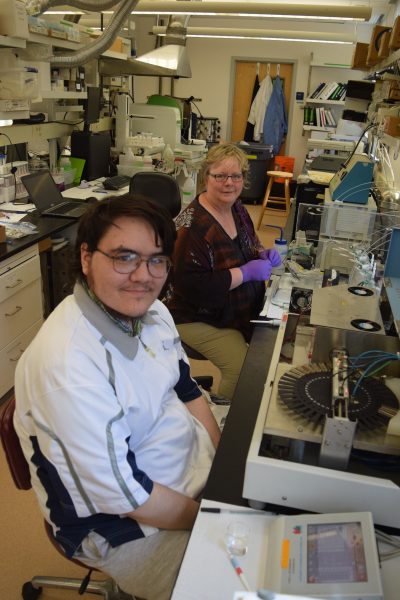BLaST Scientist of the Month February 2019
February 19, 2019

Maggie Castellini has been named the BLaST Scientist of the Month for February. Castellini is a research professional and has worked at UAF for almost 30 years in the School of Fisheries and Ocean Sciences and the Department of Veterinary Medicine. While completing a master’s degree in zoology from the University of British Columbia in Vancouver, she became fascinated with how animals adapt to extreme environments. Prior to her work in wildlife toxicology, Castellini studied diving physiology and foraging ecology in marine mammals.
Castellini is interested in biochemical and physiological processes that allow animals to handle environmental stress. Her current focus is on the effects of mercury on animals in aquatic environments and the links between environmental, animal, and human health. With this One Health approach, a BLaST core concept, she studies mercury in aquatic food webs, potential adverse effects, and potentially protective mechanisms associated with selenium and associated antioxidants. She collaborates on a wide range of other projects related to wildlife and human health.
Castellini has mentored hundreds of undergraduate, graduate and veterinary medicine students. She has worked for many years in labs that promote peer-to-peer mentoring, providing a multilayered approach to nurturing and supporting new and developing scientists. Her goals align well with BLaST aims, to provide students with enriching research experiences, develop engaging research questions and experimental design, offer analytical training, and enhance opportunities to students to present their research to the public and to other scientists.
Castellini enjoys hands-on, laboratory-based teaching, mostly focused in mentoring. She leads a team of instructors, BLaST RAMPs and graduate students in a series of BLaST-funded One Health workshops that focus on marine mammal adaptations, assessing wildlife health through live animal sampling and necropsy, and using fish and wildlife for biomonitoring. These workshops have reached several hundred high school and undergraduate students in rural Alaska in events such as Whalefest in Sitka, Alaska, and Ilisagvik College workshops and community presentations.
Contact the staff at the BLaST office at 474-5111 or stop by the Arctic Health Research Building Room 184 if you have any questions.


